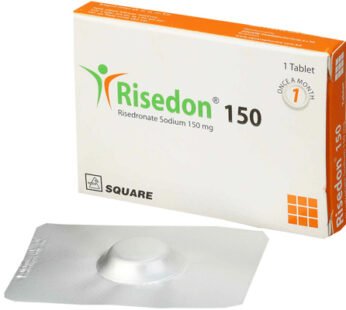Cora Kit 150 mg+600 mg+400 IU
Description
Indications:
This kit is designed for the treatment and prevention of osteoporosis. It helps increase Bone Mineral Density (BMD) and reduces the risk of vertebral fractures.
Always consult a registered physician before use.
Pharmacology:
The kit combines two essential components to combat osteoporosis effectively:
- Ibandronic Acid (Ibandronate Sodium Monohydrate): A nitrogen-containing bisphosphonate that inhibits osteoclast-mediated bone resorption. It binds to hydroxyapatite, a key mineral in bone tissue, reducing bone turnover and promoting bone mass in postmenopausal women.
- Coral Calcium and Colecalciferol (Vitamin D3): Coral Calcium, derived from marine sources, is highly bioavailable due to its similarity to human bone composition. Vitamin D3 enhances calcium absorption from the gastrointestinal tract and helps maintain calcium balance in the body.
Dosage and Administration:
- Ibandronic Acid 150 mg: Take one tablet once a month on the same date.
- Take on an empty stomach, at least 60 minutes before the first meal, drink (other than water), or any other medication.
- Swallow the tablet whole with a full glass of plain water while standing or sitting upright.
- Avoid lying down for 60 minutes after taking the tablet.
- Do not chew or suck the tablet.
- Calcium 500 mg and Vitamin D3 200 IU: Take one tablet twice daily (morning and evening) after meals.
Follow the sequence on the blister strip for easy dose tracking.
Pediatric Use:
Safety and effectiveness in pediatric patients have not been established.
Interactions:
- Ibandronic Acid: Calcium, antacids, and multivalent cations (e.g., aluminum, magnesium, iron) can interfere with absorption. Avoid taking these within 60 minutes of Ibandronic Acid.
- Calcium and Vitamin D3:
- Calcium may reduce the absorption of tetracycline and fluoride. Allow at least 3 hours between doses.
- Thiazide diuretics can decrease calcium excretion.
- Phenytoin, barbiturates, and glucocorticoids may reduce Vitamin D3 effectiveness.
- Avoid consuming spinach, cereals, or dairy products close to calcium intake, as they may reduce absorption.
Contraindications:
- Ibandronic Acid:
- Esophageal abnormalities (e.g., stricture, achalasia).
- Inability to sit or stand upright for 60 minutes.
- Hypocalcemia or hypersensitivity to Ibandronic Acid.
- Calcium and Vitamin D3:
- Hypercalcemia, hyperparathyroidism, or hypercalciuria.
- Severe renal insufficiency or nephrolithiasis.
- Concomitant use with digoxin (requires careful monitoring).
Side Effects:
- Ibandronic Acid: Hypertension, dyspepsia, nausea, diarrhea, abdominal pain, muscle cramps, joint pain, headache, dizziness, and upper respiratory infections.
- Calcium and Vitamin D3: Flatulence, constipation, diarrhea, and mild gastrointestinal discomfort. Prolonged use may rarely cause hypercalcemia or hypercalciuria.
Pregnancy and Lactation:
- Pregnancy: Category C. Use only if the potential benefit justifies the risk to the mother and fetus.
- Lactation: It is unknown if the components are excreted in breast milk. Use with caution in nursing mothers.
Precautions and Warnings:
- Ibandronic Acid:
- May cause upper gastrointestinal irritation. Use caution in patients with active GI issues.
- Correct hypocalcemia before starting therapy.
- Monitor for severe musculoskeletal pain and jaw osteonecrosis (rare).
- Calcium and Vitamin D3:
- Monitor serum calcium levels in patients with renal impairment or during long-term use.
- Increase fluid intake in patients with a history of kidney stones.
Overdose:
- Ibandronic Acid: Overdose may cause hypocalcemia, hypophosphatemia, or gastrointestinal irritation. Provide supportive care and monitor calcium levels.
- Calcium and Vitamin D3: Overdose may lead to hypercalcemia. Discontinue use and provide symptomatic treatment.
Therapeutic Class:
Bisphosphonate preparations.
Storage Conditions:
Store below 30°C, away from light and moisture. Keep out of children’s reach.








Reviews
There are no reviews yet.